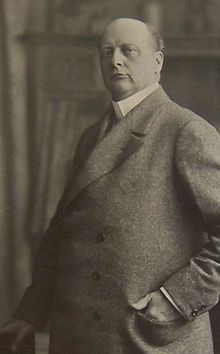Paul Matting
Paul Matting (born October 2, 1859 in Kunersdorf , † September 22, 1935 in Bad Altheide ) was a German administrative lawyer . As Lord Mayor of Breslau , he sat in the Prussian mansion .
Life
Matting's parents were Commerce Councilor Herman Matting and his wife Augusta nee. Krueger from Crossen on the Oder . Matting studied law at the Friedrich Wilhelms University in Berlin and the University of Leipzig . In 1880 he became active in the Corps Thuringia Leipzig . After the exams he entered the internal administration of the Kingdom of Prussia . After serving in the government in Danzig , he became treasurer of Stettin and second mayor of Charlottenburg (1895). After Georg Bender's resignation , the city council of Wroclaw appointed him first mayor in July 1912 with a term of 12 years.
Peak of his career was the opening of yet begun under his predecessor Bender Centennial Hall on May 20, 1913. Named after the one hundred year anniversary of the spread in Wroclaw call King Friedrich Wilhelm III. To Mein Volk , the Centennial Hall was a technical masterpiece with the world's largest self-supporting dome at the time. Due to the good acoustics, Matting was able to give his patriotic speech in front of an audience of 5,000 without any technical aids.
During the First World War Matting was able to inaugurate the Hindenburg Bridge (today's Most Warszawski / Warschauer Brücke) over the Oder in 1916, but otherwise the administration was busy with the war-related inadequate supply of the city's 390,000 residents. As a result of the November Revolution, Matting, although elected for 12 years, had to vacate his office prematurely and resigned in January 1919 to make way for the democratically legitimized successor Otto Wagner .
Matting was married to Australian Bessie White . After the death of his wife and his retirement, he married Dorothea Kowalczewski (the sister of the Berlin sculptor Karl Kowalczewski ). He moved with her to the Silesian spa Altheide and settled there as a lawyer and notary . Matting Paul died shortly before his 76th birthday. In 1937 a street in Breslau was named after him (today Ulica Weigla ).
His son Alexander Matting was a professor of metallurgy . From 1940 to 1943 he was rector of the Technical University of Hanover .
Individual evidence
- ↑ Hartwin Spenkuch: The Prussian mansion. Nobility and bourgeoisie in the first chamber of the Landtag 1854–1918 . Droste Verlag, Düsseldorf 1998, p. 329.
- ↑ Kösener Corpslisten 1960, 91 , 134.
- ↑ Breslau (territorial.de)
- ^ A b c Henryk Grzybowski: Paul Matting, Successful and Wartime Mayor , in: "Altheider Christmas Letter", issue 15, December 2011, pp. 144–159.
- ↑ Wolfhart Unte, Notary Paul Matting , in: “Altheider Christmas Letter”, Edition 8, December 2004, pp. 41–43.
literature
- Henryk Grzybowski: Paul Matting, success and wartime mayor , in: “Altheider Christmas Letter”, issue 15, December 2011, pp. 144–159.
- Henryk Grzybowski, Paul Matting, burmistrz sukcesu i czasu wojny (PDF; 2.44 MB), in: "Ziemia Kłodzka / Glatzer Bergland", No. 204, czerwiec / June 2011, pp. 10–15, ISSN 1234-9208 , in Polish.
- Halina Okólska: Nadburmistrzowie i inni urzędnicy Magistratu Wrocławia 1808–1933 , (PDF; 1.99 MB), pp. 34–35, in Polish.
- Halina Okólska: Wrocławski Samorząd na początku XX w. in: Wrocław. Miasto spotkań , Wroclaw City Office website, based on: H. Okólska: Wrocławski Samorząd ... , Wrocław 2004, ISBN 83-919528-0-0 , in Polish.
| personal data | |
|---|---|
| SURNAME | Matting, Paul |
| BRIEF DESCRIPTION | German administrative lawyer in Prussia; Lord Mayor of Wroclaw |
| DATE OF BIRTH | October 2, 1859 |
| PLACE OF BIRTH | Kunersdorf |
| DATE OF DEATH | September 22, 1935 |
| Place of death | Altheide bath |

